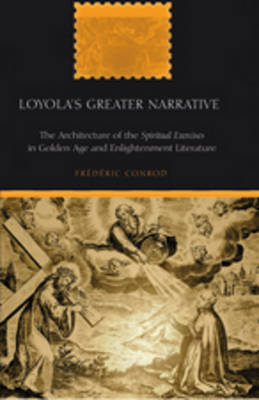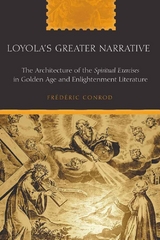
Loyola’s Greater Narrative
The Architecture of the "Spiritual Exercises" in Golden Age and Enlightenment Literature
Seiten
2008
|
New edition
Peter Lang Publishing Inc (Verlag)
978-1-4331-0249-3 (ISBN)
Peter Lang Publishing Inc (Verlag)
978-1-4331-0249-3 (ISBN)
- Titel erscheint in neuer Auflage
- Artikel merken
Zu diesem Artikel existiert eine Nachauflage
The Baroque imagination has its roots in Ignatius of Loyola’s Spiritual Exercises (1547), which defined for the Counter-Reformation era the parameters in which Catholic believers must confront the Enemy and the temporal corruption he embodies in order to enter a state of grace and obtain salvation. Through complex interactions of different imaginative functions, Loyola’s text is able to superpose a variety of simultaneous narrative levels. In order to reformulate the «greater narrative» (the Magisterium) of the Roman faith beyond what is revealed in Scripture, the Spiritual Exercises require their exercitant to become an active participant in this narrative through constant visual contact with «orders of corruption», that is, spaces in which virtue can be confronted with physical decay and sin. Through these spaces Counter-Reformation Rome (La Roma Ignaziana) would redefine the economy of salvation and diffuse the visual dynamics of the Spiritual Exercises throughout the Catholic world. In their writings, Spanish Golden Age authors Miguel de Cervantes and Baltasar Gracián use the rising modernity of the novel to transform Loyola’s notion of «orders of corruption» by adapting it to the secular world. Their encoded criticism of Loyolan imagination contributed to the epistemological crisis that marks the Baroque age, but also prepared the way for the crucial debates that would take place during the Enlightenment (such as the deconstruction of the Catholic «greater narrative» reflected in Loyola). This book concludes with a discussion of the eventual negation of Loyolan imagination in the novels of the Marquis de Sade, which undermine the Roman faith by parodying the Baroque forms of spiritual visual experience and negate the Loyolan projection into «orders of corruption».
The Author: Frédéric Conrod is Assistant Professor of Spanish at Creighton University in Omaha, Nebraska, and editor of Transitions: Journal of Franco-Iberian Studies. A native of Paris, France, he received his Ph.D. from the University of Colorado at Boulder. Conrod’s background includes religious studies, Spanish literature, and comparative literature, and his research focuses on the contribution of Baroque Spain to the Enlightenment.
| Erscheint lt. Verlag | 30.9.2008 |
|---|---|
| Reihe/Serie | American University Studies ; 229 |
| Sprache | englisch |
| Maße | 160 x 230 mm |
| Gewicht | 490 g |
| Themenwelt | Literatur ► Klassiker / Moderne Klassiker |
| Geisteswissenschaften ► Religion / Theologie | |
| Geisteswissenschaften ► Sprach- / Literaturwissenschaft ► Anglistik / Amerikanistik | |
| Geisteswissenschaften ► Sprach- / Literaturwissenschaft ► Literaturgeschichte | |
| Geisteswissenschaften ► Sprach- / Literaturwissenschaft ► Romanistik | |
| ISBN-10 | 1-4331-0249-8 / 1433102498 |
| ISBN-13 | 978-1-4331-0249-3 / 9781433102493 |
| Zustand | Neuware |
| Haben Sie eine Frage zum Produkt? |
Mehr entdecken
aus dem Bereich
aus dem Bereich
Poetik eines sozialen Urteils
Buch | Hardcover (2023)
De Gruyter (Verlag)
59,95 €



